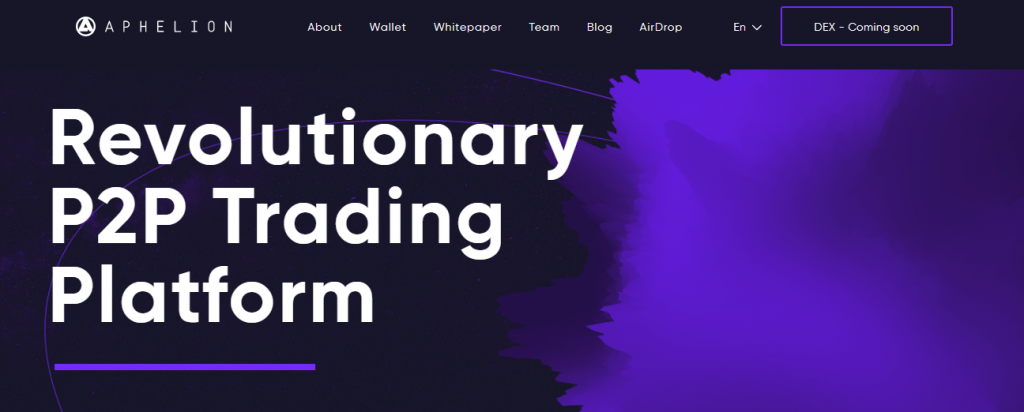
In recent years, distributed ledgers, blockchain technology, and smart contracts have disrupted a multitude of industries. According to many experts, these technologies have the potential to foster the creation of new tools that will allow crypto solutions to find mainstream acceptance.
Aphelion is an all-new blockchain service that aims to resolve many of the issues that are commonly faced by today’s most popular crypto exchanges and trading platforms. Aphelion makes use of distributed ledger technology (DLT) and employs an open source, peer-to-peer (P2P), decentralized asset distribution application protocol that has been built entirely on the NEO blockchain.
Additionally, Aphelion makes use of a tokenized transaction framework called DEAL, or Distributed Exchange Asset Ledger. All DEAL transactions are facilitated via smart contracts which are devised by users and are independent of crypto exchanges or trading platforms.
The native Aphelion token serves as a Liquidity Verification Device (LVD) that helps power transactions directly between users in a completely instant, secure, and free manner.
One can view Aphelion contracts as codes that run on the global Aphelion decentralized peer-to-peer protocol.
HERE’S AN OVERVIEW OF THE SYSTEM:
- Aphelion is an independent blockchain platform that operates autonomously and cannot be controlled by a single operator or entity.
- The native Aphelion (APH) cryptographic token is stored within a public decentralized blockchain.
- It allows for direct peer-to-peer trading without the need for intermediary third-party organizations or central authority figure.
- Aphelion facilitates universal cross-border cryptocurrency trading.
- The platform allows users to grow their on-chain and cross-chain portfolios using a unique smart contract framework.
KEY FEATURES
For starters, Aphelion is a P2P trading platform (DEX) that has been built entirely on the NEO blockchain. It provides its users with a wallet-based peer-to-peer trading experience that is streamlined and connects customers with crypto traders all across the globe.

Some of the primary advantages of NEO over other popular blockchains such as Bitcoin and Ethereum include:
- Functional Efficiency: owing to the fact that NEO employs a dBFT (Delegated Byzantine Fault Tolerance) based model, it is able to ensure the settlement of all individual transactions within its network in a highly efficient manner.
- Security: NEO deploys specially-devised smart contracts that have the capacity to integrate digital user identities, thereby allowing for real world applications for Aphelion.
- Compatibility: the NEO blockchain is usable with a wide array of programming languages including C#, .Net, Java, Python, and Go.
- Scalability: another highly underrated aspect of NEO is that it can support and facilitate up to 10,000 transactions per second.

Also worth mentioning is the fact that Aphelion allows users to trade cryptocurrencies within a totally decentralized and trustless environment. The platform eliminates third-party interference and provides users with benefits such as:
- Little to no network fees or charges
- Zero problems related to transaction delays
- Minimal frozen assets, locked trades, and hijacked tokens
All Aphelion-initiated trades are executed directly on-chain or cross-chain between users in accordance with the terms and conditions that were consented to. Also, APH tokens that are expended during individual P2P trades are automatically redistributed to all APH token holders.
Lastly, Aphelion does not function as a hosted exchange, and as a result, the company never holds onto a user’s tokens or crypto assets. The platform is completely open source-based and utilizes a decentralized framework.
HOW IT WORKS
Native APH tokens serve as the platform’s escrow device, storing the smart contract required to facilitate P2P trading between customers. For each transaction, a small amount of APH is required to compensate for network fuel expenditure. Additionally, Aphelion’s tokenized smart contracts can store order books in an immutable fashion and complete all internal trades in a fair and efficient manner.

Lastly, NEO supports the faster development and deployment of smart contracts because it is able to assist developers in the construction of DApps using programming languages that are already familiar to them.
ABOUT THE TEAM
Chris Mitchell is a primary consultant for this project. According to his LinkedIn profile, Chris has extensive experience in blockchain development and is has been a part of other high-profile ventures such as:
- RMS (Principal Software Engineer)
- Binify Inc (CTO/Co-Founder)
- SchoolRunner (Application Engineer)
Jeff Solinsky is the primary development engineer for Aphelion. He too has been in the crypto sector for over five years and previously designed and implemented “reliable high performance low memory footprint algorithms, device drivers, and networked applications”.
Lastly, Adi Ben-Ari is another key team member. According to his online bio, Adi is the founder and CEO of Applied Blockchain, a team of blockchain smart contract application experts and developers based at Level39 in Canary Wharf, London.
TOKEN DETAILS
Introduced into the market just over ten days back, the APH token has remained fairly stable in price since its inception.

After trading at $0.267 on May 1, the currency hit its market high just five days later when the price of a single token scaled to an impressive $0.77. However, its value has since stabilized, and it’s now priced at $0.324 as of May 12.
FINAL THOUGHTS
With Aphelion providing users with the ability to trade cryptocurrencies in a totally decentralized and trustless environment, it would not be surprising to see this service gain more market traction and thus become more widely adopted in the coming months.
If you would like to start investing in Aphelion, APH trading pairs are currently available on Kucoin and Switcheo Network.
